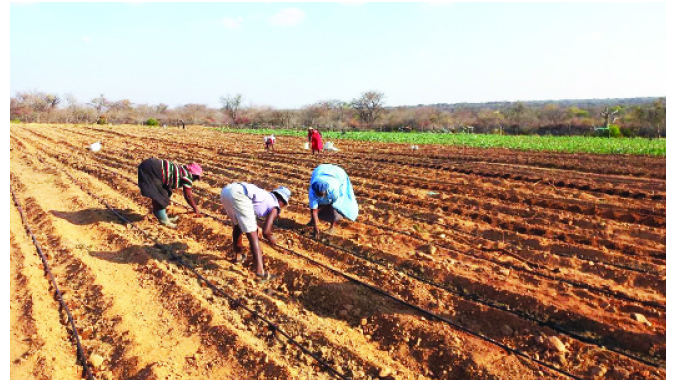Thriving Diba Village garden project transforms rural livelihoods

Sukulwenkosi Dube-Matutu, Matabeleland South Bureau
THE livelihoods of villagers from Diba Village in Bulilima District, Matabeleland South have improved following the establishment of a two-hectare solar-powered garden which has helped restore their degraded natural ecosystem.
Zilenjani Garden, which was established early this year, has 32 farmers from two villages in Ward 2. The project is in line with the rural industrialisation agenda.
Through rural industrialisation, the Government hopes to stem rural to urban migration, which saps growth from the African countryside, transferring it to towns and cities.
Rural industrialisation, which hinges on the Second Republic’s devolution policy, involves nurturing agro-processing start-up enterprises in rural areas through financial and technological support via venture capital funding and Government agencies.
The villagers have planted onions and chomolia, which are ready for the market. They have also grown maize and it is at premature stage. The farmers are also preparing to plant tomatoes.
Works at the irrigation scheme started in August last year and farmers planted their first crop of cabbages beginning this year. The garden uses a drip system.
The project was established by the Government in partnership with Practical Action under the Planting for Progress project.
The project has also assisted the community with reliable water source for domestic use and animals. The project chairperson, Ms Sibongile Ngwenya said the garden has become a source of income for villagers.
“The garden has brought huge relief to us as a community because we didn’t have an income generating project of this magnitude. We first planted cabbage and then put onions, chomolia and maize. Our crops are doing well because we have a reliable water source,” she said.

Ms Ngwenya said farmers draw water from Thekwane River through a sand abstraction system. The water is then pumped to the garden through pipes.
“We water our crops using a drip system. Practical Action assisted us with the equipment and we provided labour. We are now mobilising funds so that we can erect a perimeter fence to prevent animals from straying into the garden,” she said. She added Practical Action assisted the community with equipment which includes solar panels, water storage tanks, pipes and engines.
Another farmer, Ms Khekhe Nyathi said through the project, they have managed to sell cabbages and realised significant income.
Ms Nyathi said they have since increased the variety of crops in the garden with plans to introduce more cash crops.
“Our focus in this garden project is to maximise on production and realise significant profits. Our target is to grow cash crops while at the same time focusing on nutrition,” she said.
“So far, we have been supplying our produce to a local school and the community. We are in the process of identifying and exploring more market opportunities.”
Ms Mavis Mudimba of Thekwane Village said the project has helped them to access potable water for domestic use.
In the past, villagers used to dig up sand in Thekwane River to access drinking water.
Agricultural Advisory and Rural Development Services officer for Ward 2 in Bulilima, Mr Bhekumuzi Mpofu said the purpose of the project is to ensure that villagers commercialise farming and boost food security and nutrition.
“We have three gardens in the ward which are two hectares each. There is Zilenjani which uses a sand abstraction and then the two others get their water from boreholes. The purpose of these projects is to ensure food security and nutrition at household level,” he said.
“This is also part of ensuring that households have a source of income. The farmers have shown commitment in this project and they are producing results. We are also training farmers on how to maximise their production through improved farming techniques and methods.”
Last year, President Mnangagwa launched the Arda Vision 2030 accelerator model programme at Bubi-Lupane Irrigation Scheme meant to stimulate rural industrialisation through agricultural development in line with Vision 2030, which is anchored on driving the country’s economy into upper middle-income status.

President Mnangagwa
Under this model, the Government is stimulating industrialisation of rural communities through engendering value addition and beneficiation.












Comments